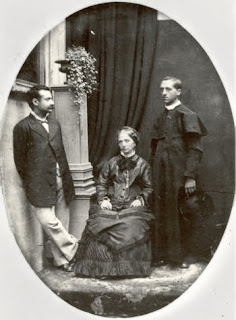The conflict between Italian Jews and the Catholic Church is at the heart of this new work by Italian composer Francesco Cilluffo. This is the first new opera commissioned by the Dicapo Opera. Il Caso Mortara is a complex, emotionally raw work that offers powerful drama, even though its titular character remains something of a cipher.
The opera retells the story of one Edgardo Mortara, a young Jewish boy who was baptized by his nurse-maid as an infant without the knowledge of his parents. At six years old, he was taken away from his parents by the Catholic Church, and eventually adopted as a son by Pope Pius IX. Edgardo took holy orders and became Padre Pio Mortara, who went around the world preaching and doing missionary work. He died in Belgum right before he was due to be arrested by the Nazis because of his Jewish heritage.
Cilluffo's first opera clearly carries the influence of Verdi and Puccini, with dissonant passages and spiky rhythms that belong to the latter half of the 20th century. Writing in Italian, Cilluffo blends liturgical music with traditional Jewish prayers, especially in an evocative scene in the first act. His goal throghout is to hammer home the conflict between these two worlds, and he does so with simplicty, clarity, and an ear for a good vocal line.
The strongest dramatic performances of the night were delivered by the singers playing his parents--Peter Furlong and Iulia Merca. Furlong has a powerful lyric tenor which was well suited to the role of the emotionally distraught father. Merca's soprano was almost too big for the theater, a dramatic instrument that conveyed her grief with power and authority. Also impressive was Christina Rohm as Rachele, a young Jewish girl who later converts.
Baritone Christopher DeVage did some fine work as the adult Mortara. The character does not sing until the second act, so it is difficult to judge his performance. His death scene was moving, with a sense of the emotional void left in the character by his conflicting religious upbringings. As Pope Pius, Chad Armstrong brought weight and depth to the role of the Pope, especially in his death scene, sung as a tenor-baritone duet with Mortara's father.
Photo of Edgardo Mortara (right) taken in 1880, with his mother and brother.
About Superconductor
Our motto: "Critical thinking in the cheap seats." Unbiased, honest classical music and opera opinions, occasional obituaries and classical news reporting, since 2007. All written content © 2019 by Paul J. Pelkonen. For more about Superconductor, visit this link. For advertising rates, click this link. Follow us on Facebook.
Trending on Superconductor
-
The helicopter attack from Apocalypse Now. © 1979 American Zoetrope Studio/Lions Gate Pictures In the 20th century, the surging string...
-
Dell'Arte Opera Ensemble mounts Massenet's Manon . by Paul J. Pelkonen In a scene from Act III of Massenet's Manon , the ti...
-
An exploration of classical music on Star Trek . by Paul J. Pelkonen (This is a classic Superconductor post from 2008 that has been rev...





